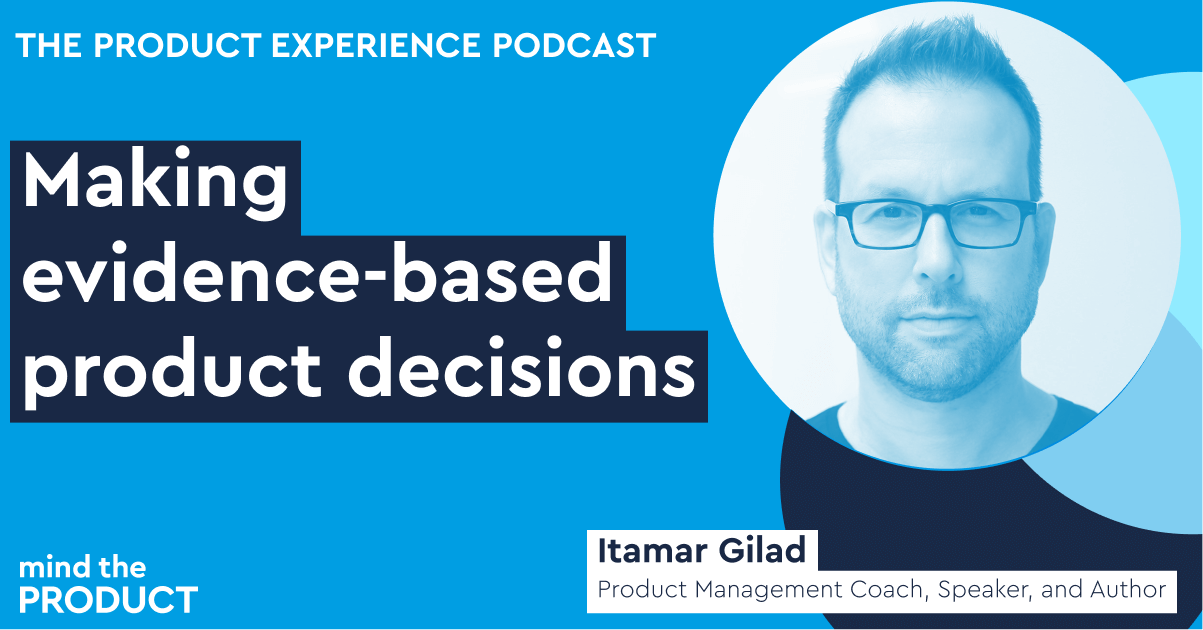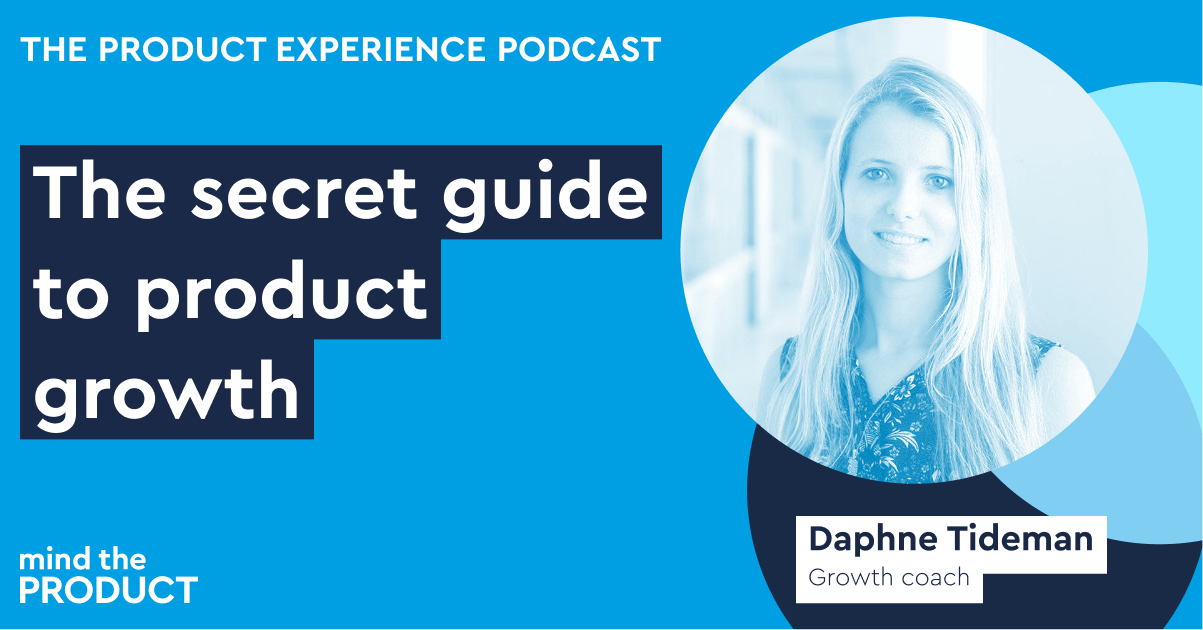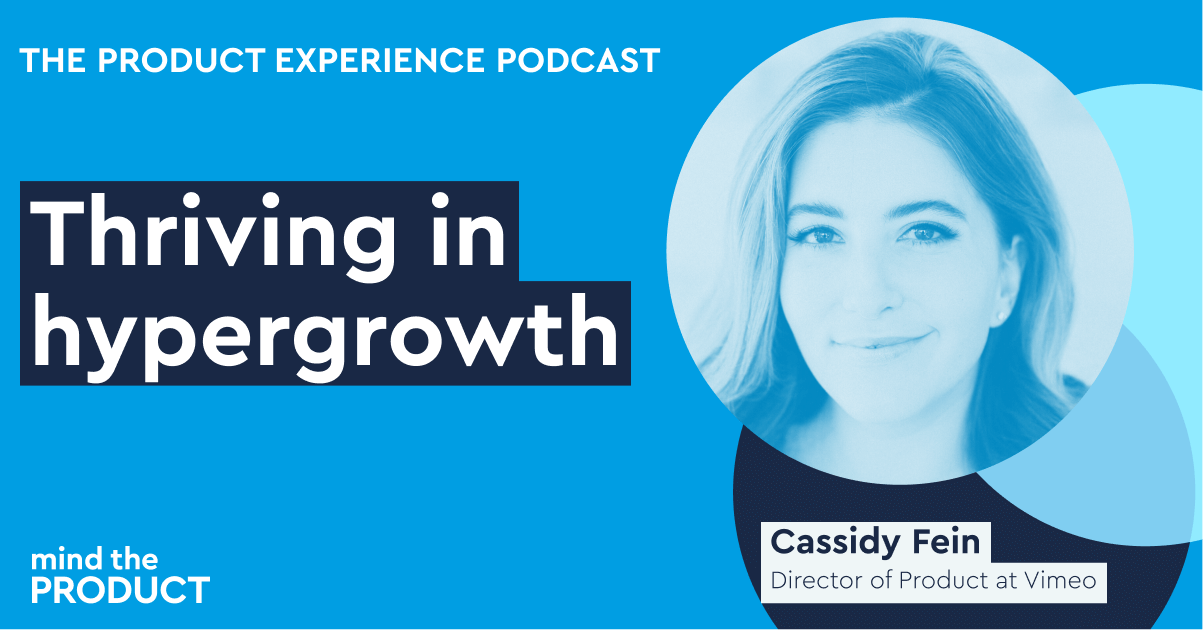In this episode, we cover:
12:28 Measuring Success in Product Operations
23:25 Understanding the Role of Product Operations
Featured links
- Follow Antonia on LinkedIn and Twitter
- Antonia’s website
- The Product Operations Manifesto
- Product Ops Overview feature at SVPG
- Product Operations – The Fuel for Winning Product Strategies’ piece on Product Lab
Episode transcript
Randy Silver:
Hey, Lily, I think we need to get our podcast operations in order.
Lily Smith :
Okay, cool, but what does that actually mean?
Randy Silver:
Um, I don’t really actually know what it means, but it sounds a bit like product operations. So let’s get some inspiration from someone who really knows their stuff in that space.
Lily Smith :
Okay, this week we talked to Antonia Landy, product Ops Consultant and Coach. All about product ops, what it is and why it matters, and whilst I only heard about this at breakfast time, she’s been talking about this for over two years.
Randy Silver:
Two, years Non-stop. Her voice must be super hoarse and her friends must be super nerdy.
Lily Smith :
Oh dear, let’s get to the chat quickly.
Randy Silver:
The product experience is brought to you by mine the product. Every week on the podcast we talk to the best product people from around the globe.
Lily Smith :
Visit minetheproductcom to catch up on past episodes and discover loads of free resources to help you with your product practice.
Randy Silver:
You can also find more information about mine, the products conferences and their great training opportunities happening around the world, and online, create a free account on the website for a fully personalized experience and to get access to the full library of awesome content and the weekly curated newsletter Mine. The product also offers free product tank meetups in more than 200 cities. There’s probably one near you, antonia. Thank you so much for joining us today. How’s everything going Excellent? Thank you so much for having me. We both hung out with you just a couple weeks back at the Wonderful Product at Heart Festival or conference Felfelika Festival in Hamburg, and we had a great time at where you and Lily were both speakers. So obviously we all know each other really well. But for people listening to the podcast, can you just give us a quick intro? What are you up to these days and how did you get into the world of product in the first place?
Antonia Landi:
Of course. So right now, a freelance product operations consultant and coach. There are very few of us in the world, but we do exist. And goodness, how did I get into product? I studied English literature and journalism, so nothing to do with tech at all. I just sort of fell into the tech scene via a games tester job when I was living in Scotland, eventually sort of played that forward, got involved in startups, got closer and closer to the product discipline and eventually realized that’s what they really wanted to do. So I went for it and also at some point fell into product operations. And now I’m here.
Randy Silver:
Oh, as someone who has an arts degree in biology and journalism and spend many years as a journalist. I can testify it’s a perfect background for all of this. But, more importantly, okay, product ops. This is something that lots of people talk about. Lots of people pretend they know what it is, but you are an actual expert in it. So we’re going to get deep into product ops today, but let’s start with the basics. What is product ops and what do most people get wrong about it?
Antonia Landi:
Okay, well, first of all, I wouldn’t call myself an expert. I think I’m just one of the people that has been talking and writing about it for a while. What is product ops? So over the years, I’ve actually used a few different definitions. I started with it makes the product manager’s jobs as easy as possible. Eventually, I stopped using that because that’s not actually true. Sometimes I make it quite a bit more difficult. More recently, I’ve started talking about product ops as enabling product management excellence. Now, what I mean by that is that it facilitates product managers to do their best work. Right, that’s essentially my mission. That’s what I’m there for. Now, the reason product ops can have many different practicalities at many different companies is because the barriers to that excellent work look very different. Right and inherently, product ops addresses those barriers. So, mission wise, we are driven by the same purpose, and that is enabling excellent product work. What that looks like in practice can be very, very different.
Lily Smith :
So for me the ops part of product ops is. It implies to me a certain operational aspect of the function and it makes me think of the tools that we’re using and the meetings that we’re having and that kind of thing. So does product ops focus more around operations or is there kind of like a coaching, like softer element to it as well?
Antonia Landi:
Yeah, I think it’s both, and I think that’s what actually confuses a lot of people when I start talking about product operations, because they hear the operations part right, they don’t necessarily hear the product part or the maybe almost implied or inherent enablement part that comes with that. Broadly speaking, I would say that product operations it focuses on operationalizing the product management experience. However, part of that are different strategies and one of those strategies is coaching right. So coaching could come in many different ways Could be are we using a particular tool to its fullest right? When you adopt a brand new tool, people need to learn how to use it, how to work with it. At the same time, product operations can also enable things like product discovery. And if you have, maybe, a team that is made up of fairly junior product managers and owners, or you are in a company that is maybe early on in their product ledged transformation, sometimes what you will have to do as a product ops manager is actually coach people on well, how do we actually do product discovery. So it’s not just about sort of the frameworks and the tools and the processes around getting that done. It’s also about well at the conceptual level, how do we actually do this?
Randy Silver:
Okay, so that’s a big area. There’s a lot that it could be, and there’s a lot of people. That might be why people get confused. And you had this wonderful slide or maybe a terrible slide in your talk in Hamburg where a head of products said something to you about why is she even here if she’s not going to create the mural boards for us?
Antonia Landi:
Right.
Randy Silver:
So let’s clear this up. We know the purpose of what you’re here, but you did recently did a product operations manifesto with a bunch of other people, so I know you’ve had conversations with other people in this space. Yeah, what do product operations people actually do on a day-to-day basis in general?
Antonia Landi:
What does it was a typical day or week, look like so there are a few focus areas that are sort of starting to crystallize and Become, I wouldn’t say the standard, but become fairly common, regardless of which particular company you’re talking about. I can talk about my personal experience, right, because, as I said, or lived experience can be quite different. To me, product ops has looked like Creating a communication strategy. So how do we talk Within the product organization about what goes on? How do we talk to the rest of the company? How do we maybe even talk to the rest of the world about what goes on? It can be things like Closing feedback loops is another popular one, right? So how do people within the company, let’s say, report bugs, and then what’s the process around handling that, prioritizing or deprioritizing it, and then how does the person that has raised this issue get informed that this is fixed or won’t be fixed, and you know how does that cascade down to the customer. Another thing we can facilitate is discussions around strategy, right, so not actually doing any of the product work ourselves, right, but facilitating discussions. Facilitating, let’s say, you have a quarterly Okay, our review, or you’re setting, okay, our ex on a quarterly basis. What does the process around that look like? Who needs to be involved? Who needs to be invited? How do we document that? What’s the structure for that type of documentation, and when and where do we refer back to our goals Within, let’s say, this communication strategy that we just talked about? Right, so it’s really about creating an operating system for the product organization that is repeatable.
Lily Smith :
And it sounds like the kind of thing that every product manager would like help with. But, I imagine there are some businesses like there are some size of businesses or types of businesses where product ops is more prevalent. Right, what are you kind of seeing on that side now, like where is this being introduced as a function?
Antonia Landi:
So I’m seeing, broadly speaking, two trends. First, our organization at a corporate size. So we really stopped talking like thousands of employees as opposed to hundreds 30 to 50 product managers, for example, who really are at a size where they need things to be managed Right. It’s no longer enough to just do this on the side. It’s no longer enough to just assume that, let’s say, heads of product will be just picking this up on the side. This is a process that involves many more people. It has many different touch points. It’s something that is almost a product of its own. Then there are companies that are much smaller, right. Let’s say, around three to five hundred employees in total Maybe we’re talking about 10 product managers where either they very strongly believe in setting their product team up for success as they grow, or they’ve sort of landed in a position where they were a startup for quite a few years and they now need to quote, unquote grow up, right. So these are sort of the typical companies I see starting to invest in product ops.
Randy Silver:
We also had an interesting discussion at one point here. I think you corrected me when I said you’re in product ops and you said no, you’re a product manager of product ops, which is fantastic. So I’m asking this for clarity’s perspective what is your product? I’m guessing I know the answer, but what are your measures of success, based on the things you talked about in building an operating system? How do you know you’re doing a great job?
Antonia Landi:
Yeah, excellent question. So I consider my product to really be the product organization and everybody that’s in it. Now, of course, when we talk about product ops, for some people that means focusing on product managers specifically. For some people, especially in slightly smaller companies, that might mean focusing on everybody in a product team, so also looking at designers, data engineering, qa, etc. So that’s to me, my product is really the product organization. When we start talking about measures of success, it becomes very interesting, and I think one thing that I often say is that our measures of success are, by definition, somewhat imperfect. We can measure very tangible things. If we go back to Discovery, for example, how many times a month does a product manager speak to customers? We can influence that number, we can make it go up. We can make it a lot easier. We can even put guardrails around. Hey, if you’re not talking to somebody every week, then an alarm bell is going to go off. So we can positively influence something like that. However, there is an underlying assumption that speaking to more customers will lead to a better product, and that’s where things start to not break down a little but become a little bit theoretical, and I think that’s the case for many of these product management best practices that we’re ultimately trying to enable. We can track certain things in a very tangible way, but ultimately it is based on the assumption that that will lead us to create better products. Regarding success metrics, I like to have a combination of measuring the organization’s sort of effectiveness, let’s say, as a whole. We can do that with, let’s say, a quarterly survey, something very standard, but I also like to track specific initiatives. Now, the reason for that is obviously I have a product management background, so this comes somewhat naturally to me. Might not come naturally to every single person in product operations, but the idea here is really that you iterate. You have an MVP, you start with the leanest way possible to prove or disprove your hypothesis of what a potential process improvement could look like, for example, and then you make sure that you’re actually on target or you’re not, and if you’re not, you start again, you try again and you reiterate.
Lily Smith :
Hey, randy are the rumors true, Billy?
Randy Silver:
I can’t believe it. Mtp are giving away all nine of the San Francisco keynote talks for free, both the recording and a written summary of each one.
Lily Smith :
And handy discussion points and thought starters to think about solo or with your team.
Randy Silver:
And an email notification each time a new talk is published on mindtheproductcom.
Lily Smith :
So you’ll never miss a talk and be the first to hear when the next one is hot off the press.
Randy Silver:
Of course, nothing can be detending MTP Khan in person, but this is the next best thing.
Lily Smith :
So sign up at mindtheproductcom forward slash sf keynote kit. That’s mindtheproductcom forward slash sf keynote kit. So as a product ops person, it sounds like you need to be very experienced at product management. So, rather than it being almost like a supporting function and a potential route into product management, it’s more like a another potential deviation from like. Once you have many years experience as a product manager, you could sidestep into a product role.
Antonia Landi:
So something very interesting has started happening recently and people are really starting to view product ops as a stepping stone into product management, and to me, that’s very interesting because I feel like that’s you’re doing it completely the wrong way. Actually like being in product management should be a stepping stone for being in product operations. However, I think there is some leeway here, especially when we’re talking about the type of person that you’re hiring to be in your product ops team. Now, do I think it’s important for your first product ops hire to have product management experience? Yes, do I think every single person in product operations needs to have product management experience? No, what to me is the most important is a display of and this is a bad way of putting it, but essentially a product mindset. What do I mean by that? It’s really problem validation, it’s solution hypotheses, it’s MVPs, it’s trying out what you’re going to implement before you implement the whole thing and then iterating and measuring. Right. To me, that is the most important aspect. I do think you need to have had a certain closeness to product before starting in product operations, but you don’t necessarily need to have been a product manager unless you are this sort of pivotal first person in this role. Why isn’t this stuff?
Randy Silver:
the responsibility of the existing product managers or the heads or directors of product. Why should someone else do it? And if you offload the responsibility for it to somebody else, does that make them less involved or less responsible?
Antonia Landi:
Now I have a theory that product management has become increasingly more complicated over the past few years and this type of work is no longer sustainable to just be done on the side. Now, in all fairness, most companies today operate without a product ops function and most of them are successful enough. Right, it’s not a necessity to have product operations, at least maybe not yet. I think the interesting thing here about product ops as a separate function really comes from looking at all of these individual tasks holistically and really no longer thinking about, well, how do we solve this particular issue, but think more about how do we solve this particular issue sustainably in the long term and how does this tie in with all of the other issues we’re currently solving and, ultimately, where do we want to be as a product organization. It is true that most of this work so far has been done by product leadership, but I also feel like that is a huge risk in not giving these people enough space to actually follow up on the strategic work that is incredibly important to the whole product organization.
Lily Smith :
And what’s your experience been of working with different organizations, like what’s the sort of trigger point at which they say, okay, now we need to bring this new function in, and how does that initial transformation happen? How does it go? Is it welcomed or do people freak out?
Antonia Landi:
So usually there is one person that really strongly believes in this. Now, it’s very helpful if that person also has some influence on the budget and can actually hire somebody right? That’s just how most product ops teams actually come to life, right? Somebody usually a product leader has heard about the function, maybe experienced it in a previous role, and now feels like, okay, I want to keep working alongside this function or I want this function to be a reality at the organization. A lot of what product ops does is change. It’s changing how organizations operate and changing how certain people operate. Sometimes that change is very welcome, especially if you’re the person that has been receiving a lot of this pain. Right? When I speak about product ops to product managers, seniors up to the level of head of product, they almost always instantly get it because they feel that pain firsthand almost every day. They’re like yes, I know exactly what you mean and I would love to have this. Now, when you go sort of towards VP or CPO level, it becomes a little bit more difficult to make it tangible because these folks are typically not quite as exposed to this sort of day to day pain. Let’s say, now some people really welcome it. Some people are like, oh, you know, it’s like the second coming of Christ. It’s like, yes, like we need this. Finally, I’m so happy I can offload all of this sort of mental load right to somebody else. For some others it can feel quite threatening actually and I think there is a kind of misconception here that I come in and I tell you how to do your job, or I come in and I’m sort of on a secret mission to report everything back to the CPU, or I’m sort of the disciplinary right that waggles my finger and says no, no, no, this isn’t the process. Follow the process, and I think that’s when it gets very hard to kickstart product ops as a function.
Randy Silver:
A lot of our listeners will probably be familiar with the article that Marty Kagan wrote a while back, or with the stuff that Melissa Perry has talked about in this space as well, and one of the things you just talked about and you talked about earlier that sometimes you might make life actually a bit harder for the product managers, at least in the short term. It touches on something that Marty talked about, which is we got rid of project management offices in a big way when we brought in product, and when it’s done badly, product ops is kind of the revenge of the PMO or PMO under another name. So let’s talk about what a bad implementation of product ops looks like and versus a good one. Why is this not the PMO coming back?
Antonia Landi:
I mean bad product ops is exactly what Marty Kagan was talking about. Right, it’s process for process sake. And the thing is, I know where he’s coming from because I’ve lived through those exact same realities where, even though I wasn’t doing product ops in previous roles, I was working very closely to implement processes and startups and I wasn’t allowed even to say the word process because then people would absolutely immediately shut down. But the reason for that is that people have been doing it badly, right, and sometimes there are just people that will insist on a process even though it actually slows everything down, even though it’s actually less agile than what we had before. And I think it’s really up to us individual product ops managers to stand up and sort of help people understand that what we’re doing is product management, product management, but for the product organization right, if there is something that works I don’t need to touch it, then I’m not going to touch it, like I love talking about lean operations. Right, because I feel like that’s the closest I can come to describing the way I do product ops, because it’s really what’s the smallest amount of disruption or the smallest amount of change that we can implement that will ultimately lead us to becoming a better organization.
Lily Smith :
So One thing that I kind of heard in the product groups that I’m in was when someone was kind of talking and we’ve sort of talked a bit about like what product tops people do, but we were talking about, there was a group of people in a group that I’m in talking about product tops and someone saying, yeah, so they do all of our like you know, look after all the analytics, reporting and right, you all are admin and and I was a bit like really that’s not what I understood product ops to be. So is there? I’m just wondering, are there like two different things here going on that are both products or both being called product ops, but two different things that there’s like almost product admin? and then there’s product ops.
Antonia Landi:
Sorry dog.
Lily Smith :
Like every time I talk, he starts.
Randy Silver:
We’re going to have a little bit of Ringo in the podcast. It’s character.
Antonia Landi:
So it’s actually very interesting to see this development because I feel like it’s so closely mirrors what happened with product management, right, we talk about product managers and product owners, or we talk about product managers and disempowered product managers, and I think exactly the same thing is happening in product operations. We have people who do product operations and we have people who have been hired under the name of product operations, essentially being glorified team assistants, and I think that’s exactly what you’re referring to. And, again, I think it is really this operations word in the term, product operations that, to a certain extent, also throws people right. I had somebody tell me it’s like oh, this is perfect, this is great. Product ops does all the things nobody else wants to do, and it’s like we’re not, we’re not a bin, right, we’re not a bucket of things that everybody can just throw stuff in because they don’t want to do it and they just get to do all the exciting stuff. Like it is legitimately also a strategic role, right. And when I, when I say this, people get really confused because they’re like well, so you’re doing product strategy, and it’s like no, no, I’m doing product operational strategy, right? I Want to have these conversations with senior leadership about what kind of product organization do we want to be in three years? Right, and then play it back. What does that mean for us in the next 12 months? Concretely, what does that mean? Needs to happen in the next six months? And then that is effectively my roadmap, right? So it’s very interesting to see exactly the same conversations taking place. Like I started as a product owner and I was terribly disempowered. I was in a feature factory. I was just given things to do and then I just had to make sure that they saw the light of day, regardless of whether they made sense or not. And it’s exactly the same in product operations today. So with this kind of misconception and this misunderstanding, it must make hard to understand.
Lily Smith :
This kind of misconception and this misunderstanding it must make hiring for this role a bit of a minefield because, yeah, could be misinterpretations or different expectations from the person applying for a job and from the hiring kind of side of things, if you’re an experienced product ops person coming in and they’re just at, the expectation is, you know, from that kind of glorified admin assistant. So what advice do you have for people hiring into this or people wanting to get a role in this function?
Antonia Landi:
Yeah, I think the most important thing here is honestly like, to a certain extent, don’t even rely on the job descriptions, because I think, as most of us have experienced firsthand, they rarely tell the whole story. I think that the interview with the hiring manager is really the most critical point. Here and there it really becomes a question of well, ok, how do you as a hiring manager define product ops? But also, very concretely, what do you see product ops as a function solving? And typically, the answers to that will then give you a good insight into the sort of responsibilities that you will be doing. You will be doing more than what this may be written on paper somewhere.
Lily Smith :
Awesome, I think we’ve got time for probably just one more question. It’s been really really great to hear your perspective on product operations and really interesting to kind of see this function develop and Gain traction as well, and I’m really excited to see the direction it goes in. What’s your sort of prediction for the future of, like evolution of product ops? Where do you see it going?
Antonia Landi:
So I’m actually not sure where it will go. I have certain hopes and aspirations for the function myself. My hope is that we will Become less of a fad, less of a trend and more of a really established function. I don’t think it’s going to happen anytime soon that our role will really be a given Right. I think, for the foreseeable future will definitely still be A luxury to a certain extent that, you know, only companies with a certain amount of budget and a certain amount of people can and will invest in. However, I think I personally, and very selfishly, would love to start having conversations around how do we do product ops successfully, and what does that successfully actually look like, and what does that mean for the organizations that employ us, rather than what is product ops? So I’ve I know we keep getting new people join this conversation every day, and every day we keep, you know, needing to talk about what actually does product operations do. I’ve been having this conversation for over two years, so I would love to start talking about what makes this successful.
Randy Silver:
Oh, come on two years. We’ve been having the argument about whether people are product or project managers for way longer, so I’m saying selfish hopes and dreams.
Lily Smith :
Antonia, thanks so much for joining us on the podcast.
Antonia Landi:
Thank you for having me.
Lily Smith :
The product experience is the first and the best Podcast from.
Randy Silver:
Mind the.
Lily Smith :
Product. Our hosts are me Lily Smith and me Randy Silver.
Randy Silver:
Lu Run Pratt is our producer.
Lily Smith :
Lu Run Pratt is our producer and Luke Smith is our editor.
Randy Silver:
Our theme music is from Hamburg based band POW. That’s PAU. Thanks to Arnie Kittler, who curates both product tank and MTP engage in Hamburg and who also plays bass in the band, for letting us use their music. You can connect with your local product community via product tank Regular free meetups in over 200 cities worldwide.
Lily Smith :
If there’s not one near you, maybe you should think about starting one. To find out more, go to mindtheproductcom. Forward slash product tank.






Comments
Join the community
Sign up for free to share your thoughts